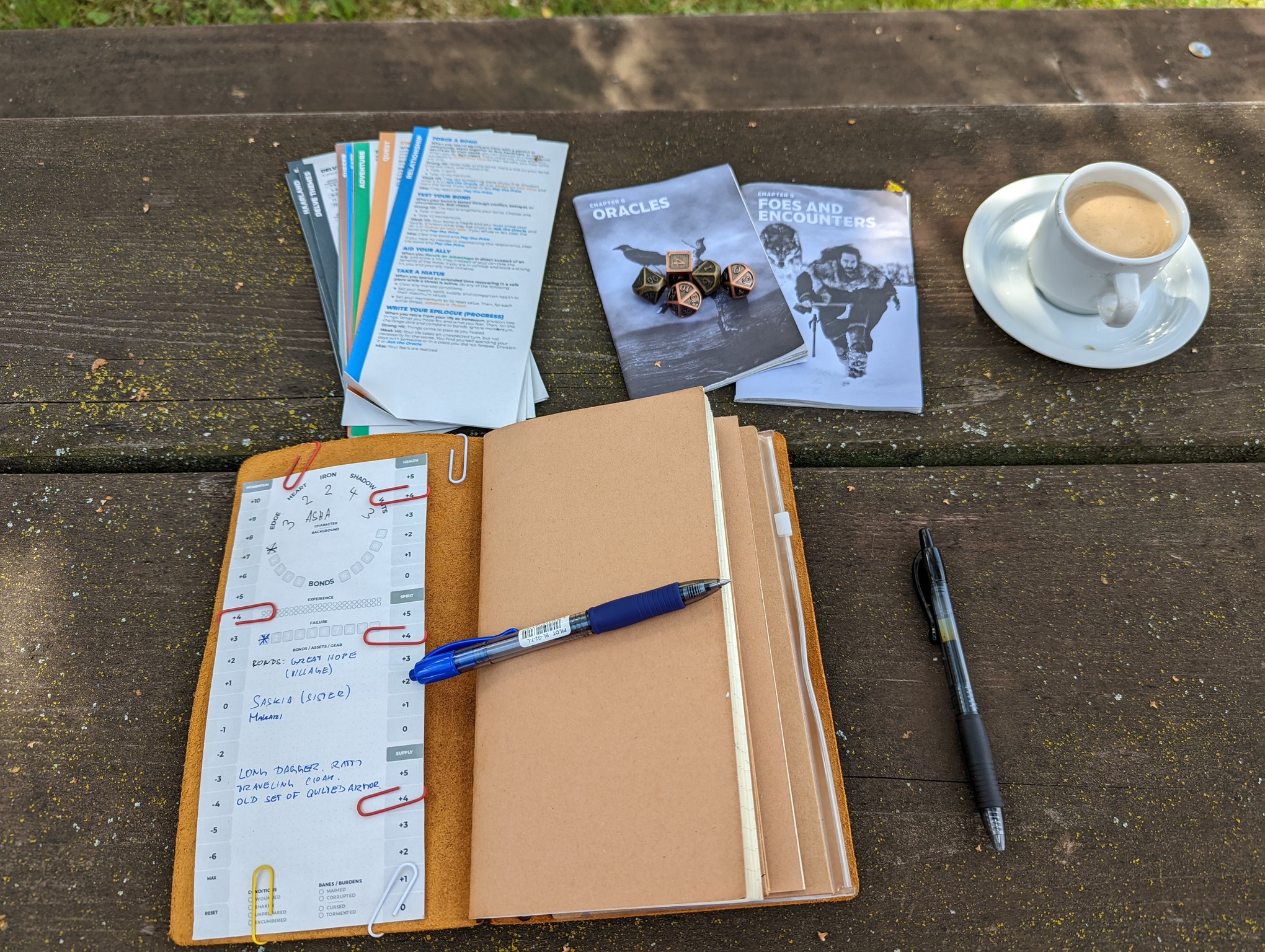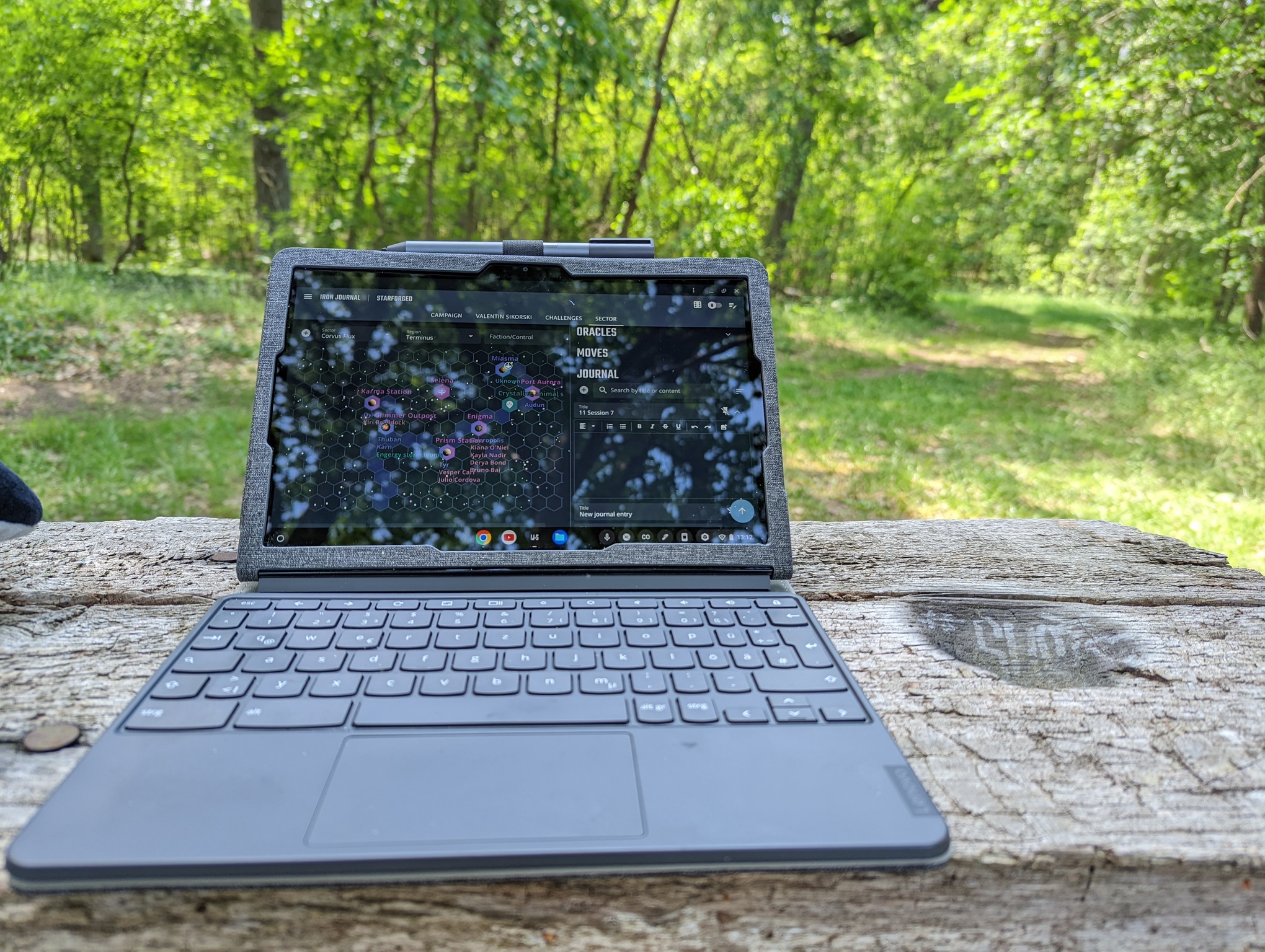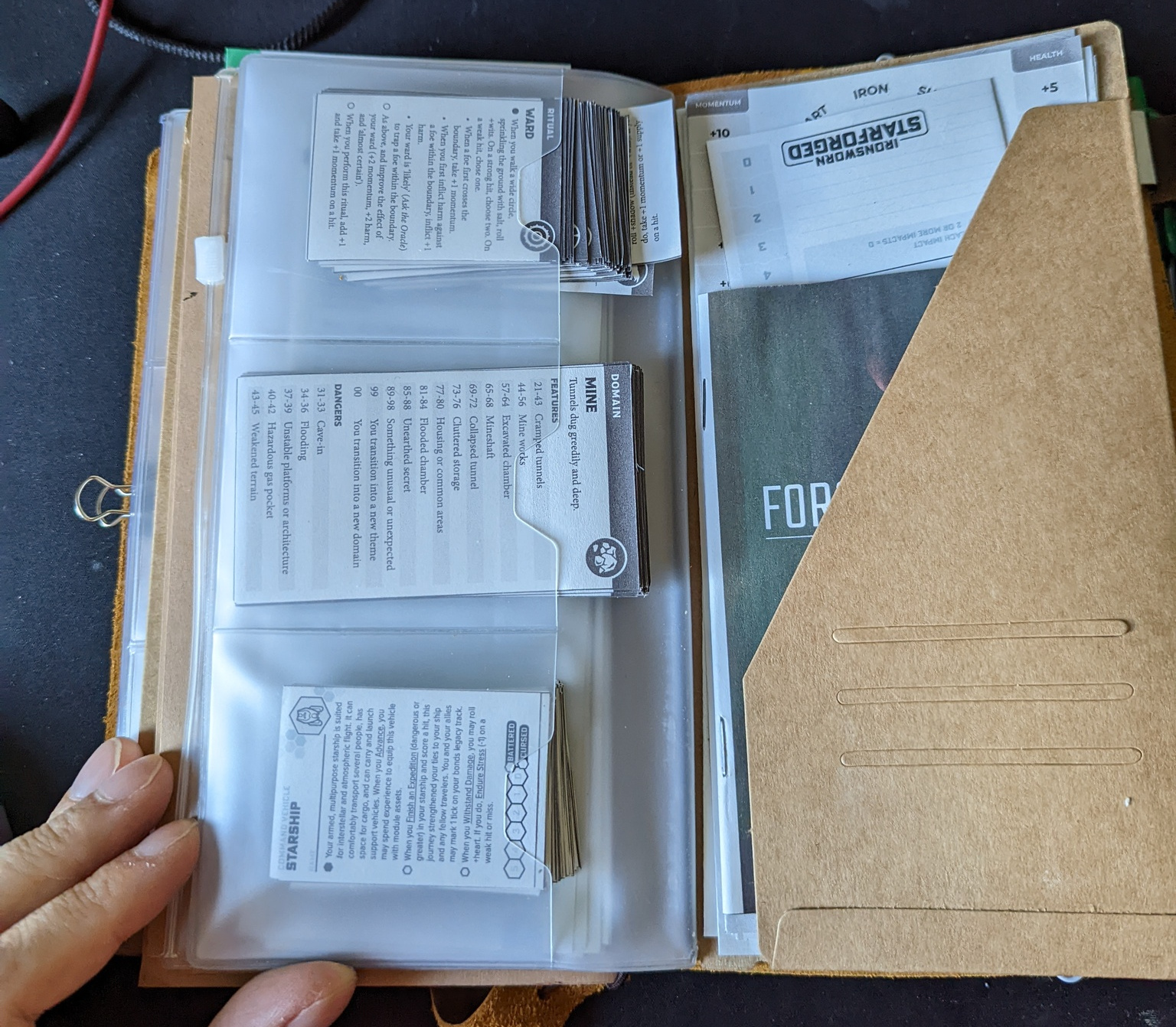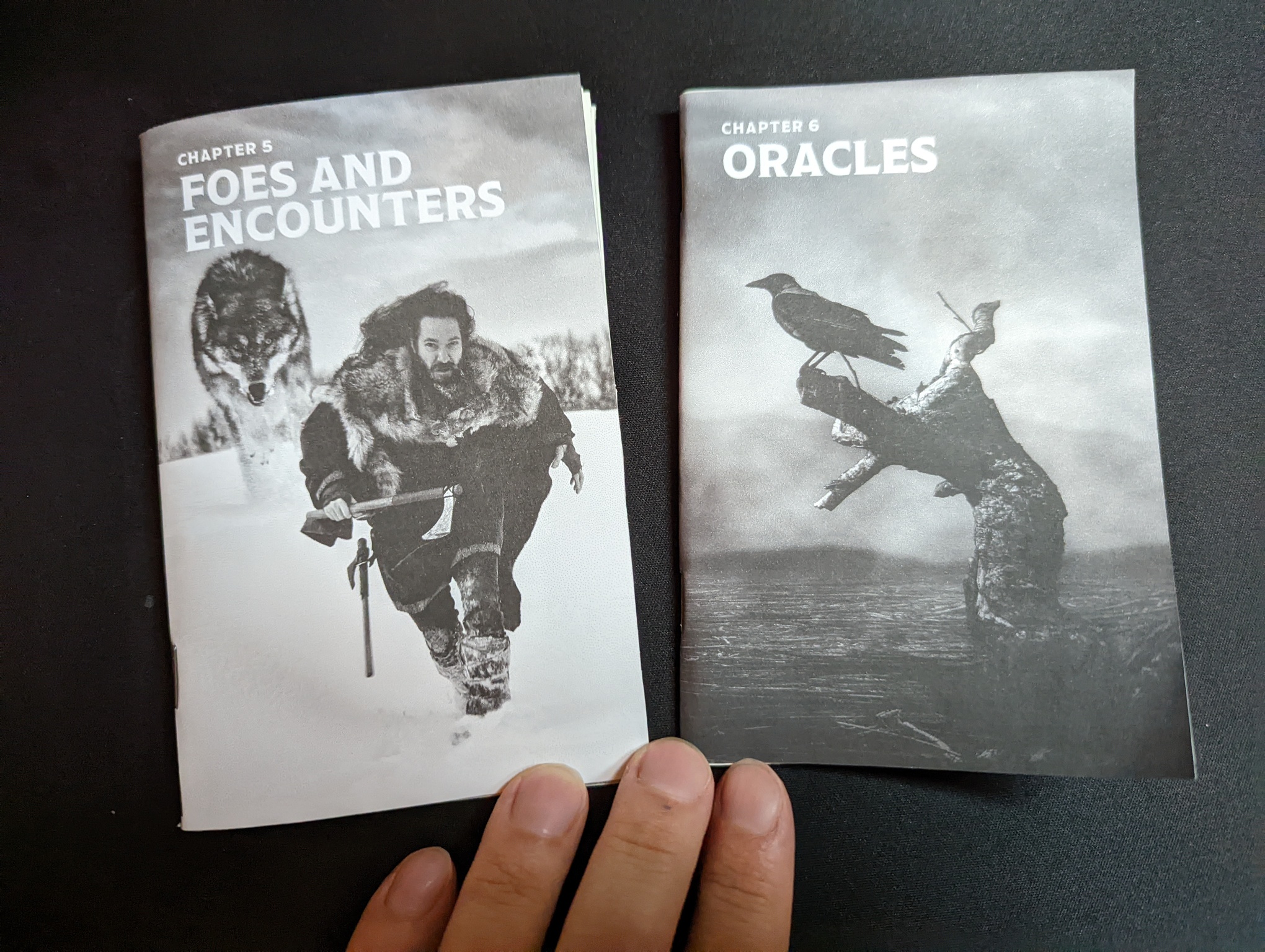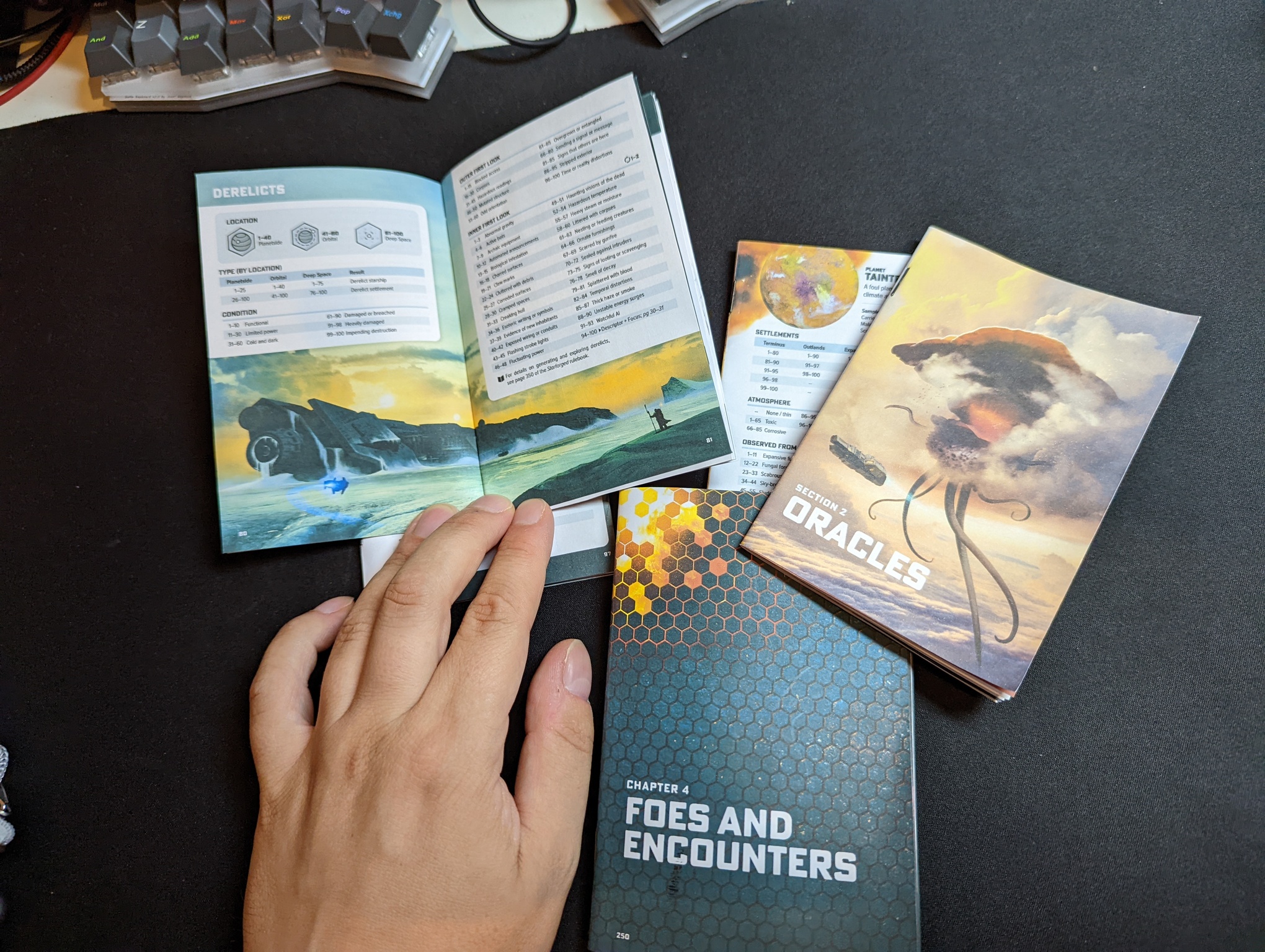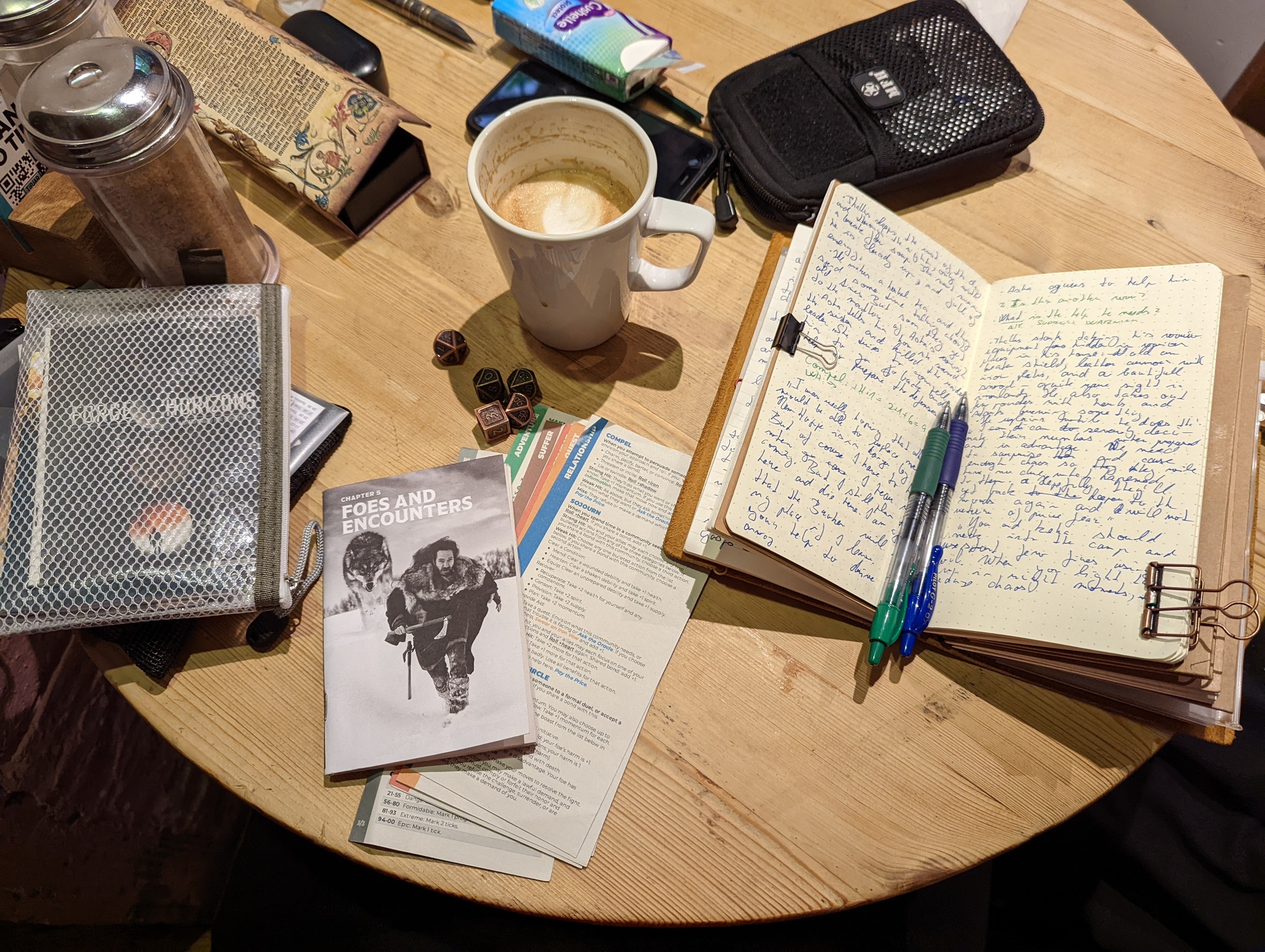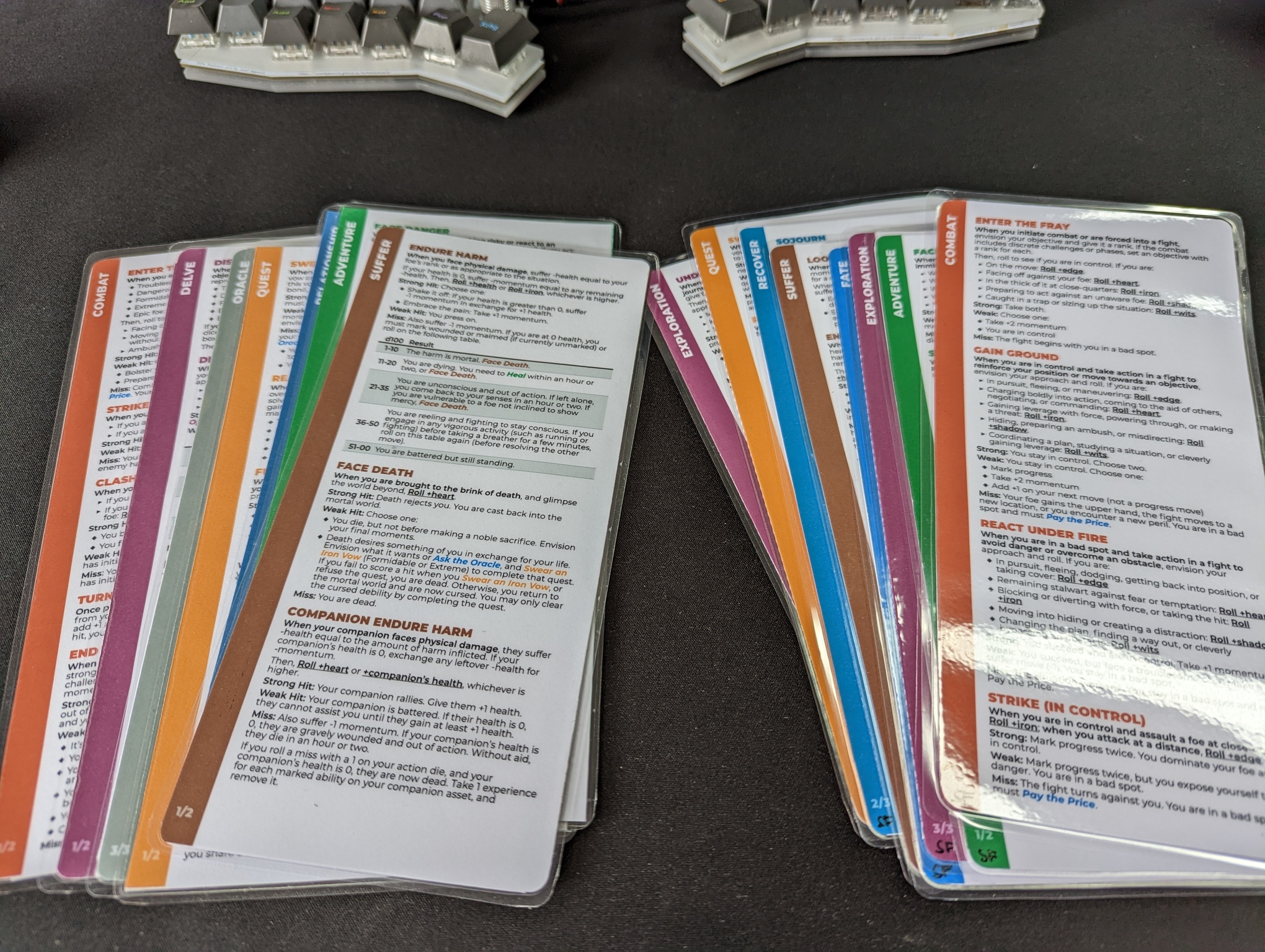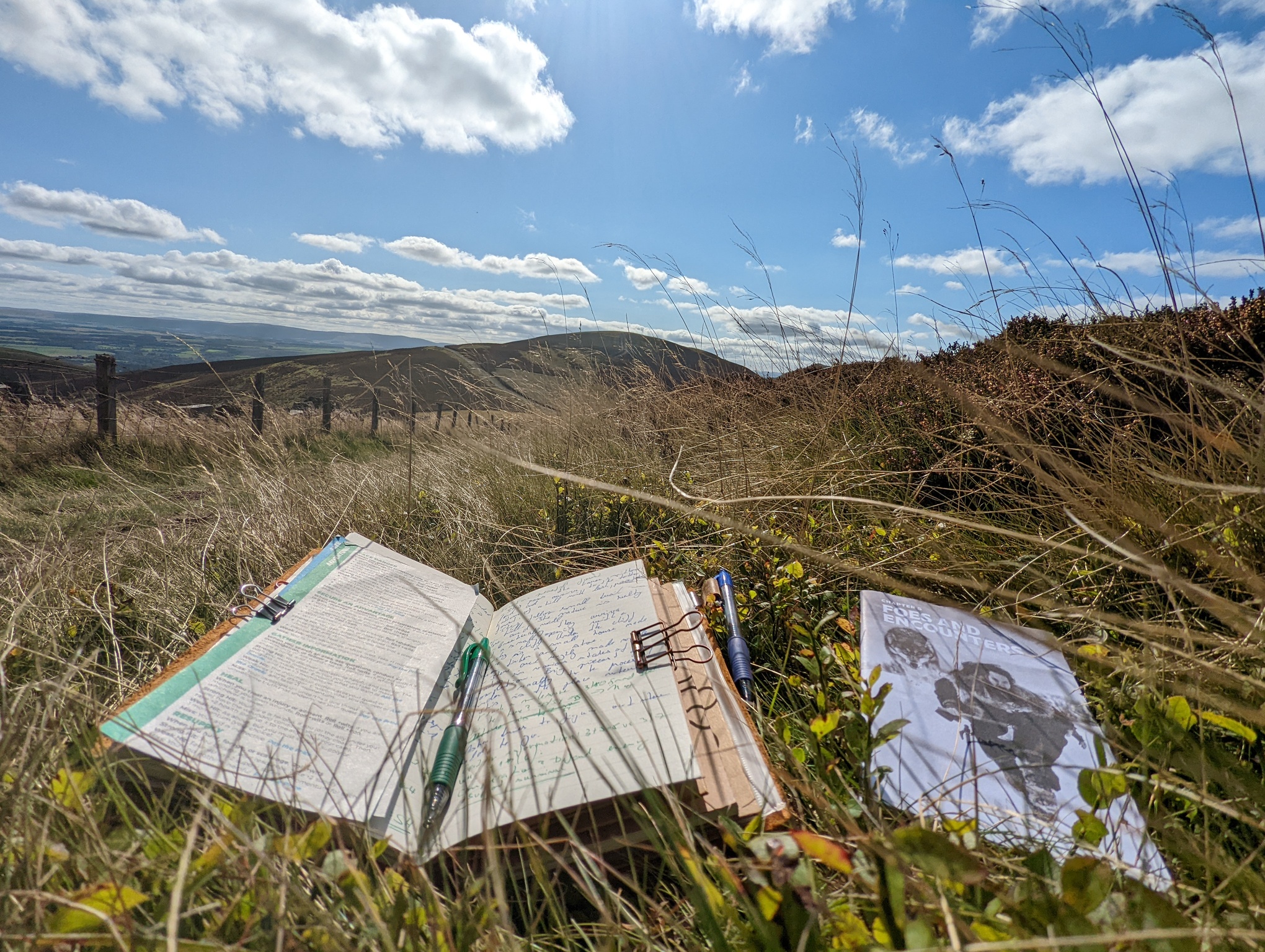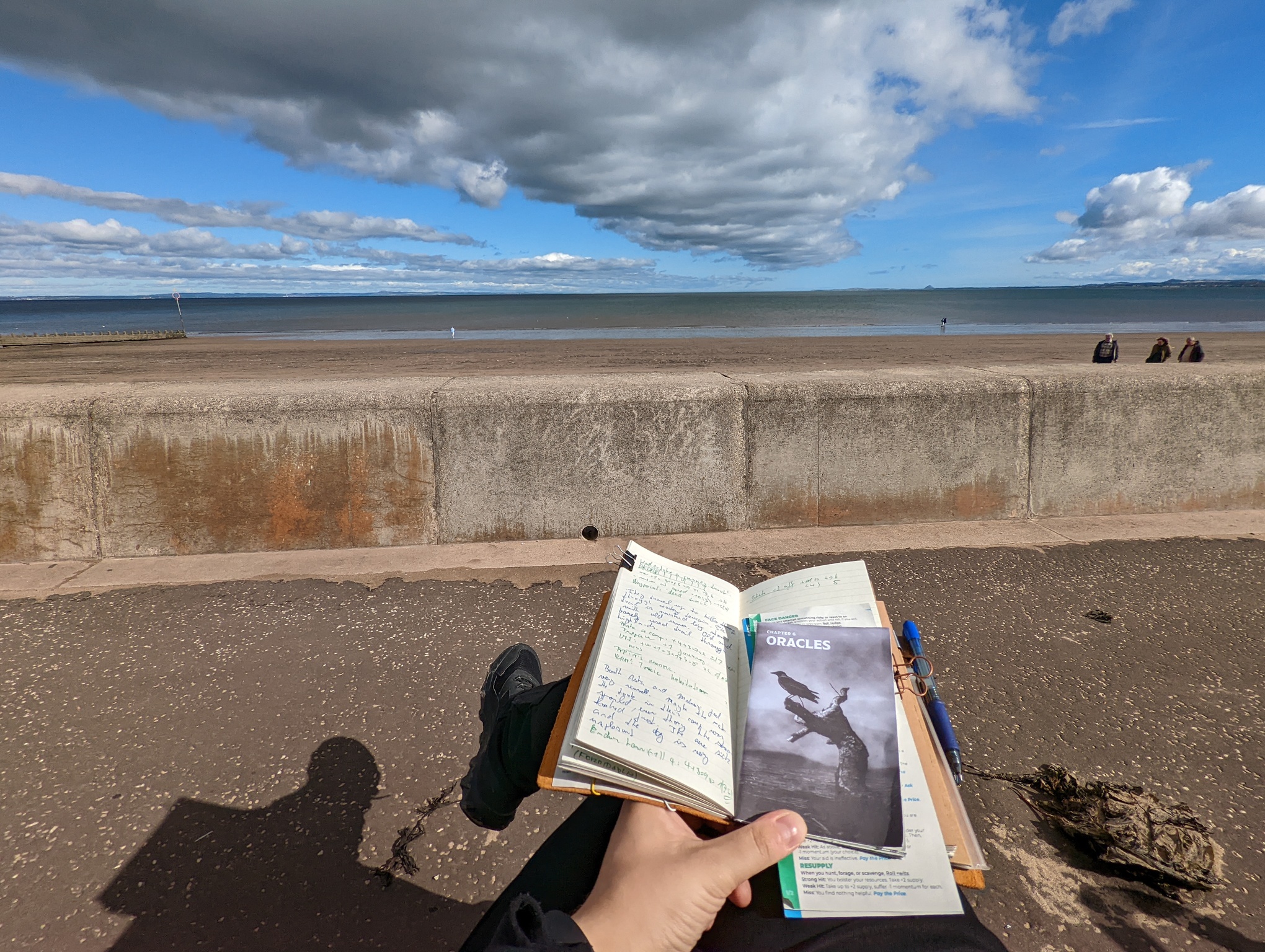The concept of playing TTRPGs alone sounds very odd and very appealing at the same time. This post is about how is my relationship with solo RPGs developing.
I am a very socially anxious person, therefore playing TTPRPG solo is a very appealing concept for me. However, it does sound weird. Am I going to be sitting at the table, rolling dice and talking to myself? How could that work? Solo RPGs, mainly Ironsworn and Ironsworn: Starforged are a huge part of my personal TTRPG renaissance.
How I started
I started as soon as Starforged released. I was late to join the Kickstarter, I was event too late for the “late pledge”, but I bought the physical copy as soon as the store opened and therefore got the PDFs and I dove right in.
I even started capturing my first Starforged experience in written form on this blog. It has so far 8 parts. I moved on and started playing other characters, but I am quite sure I’ll return to Valentin Sikorski, the space courier soon.
My first gaming setup was in front of my computer. PDF with the book and captured my sessions in Stargazer. Stargazer is a very nice web application for solo play of Starforged. It can run in fully offline mode, even on mobile devices, has moves reference, all the oracles for random generation, star map and a possibility to write down journal entries. It’s truly amazing application which keeps getting better.
First struggles
One of the big things each solo player has to figure out for themselves is how they capture their sessions (and if). For me, writing is the obvious choice. Talking to myself would feel much weirder and could be annoying to people around me, and that would limit the possible times when I could play. Just imagining things in my head also didn’t feel good enough.
However, I type quite fast on my keyboard, so it felt like an obvious choice. And because I have a blog, I could even publish it, couldn’t I? I know that no one will actually be interested in the produced text. But I like to write down things around me as some kind of diary of my projects, what I did and learned. I don’t do it for others, but for myself. That was always the case. And if someone stumbles upon my ramblings and finds them interesting? Well, that’s indeed nice, but not required. I approached my solo play in the same way.
You can read the results. It’s a weak prose. Partly because English is my second language, partly because I didn’t want to invest too much time into producing it and also, I am no writer.
We have already stumbled upon one interesting point: I imagine and capture the story in English, even though It’s my second language. Why? Mostly because I can, partly because I wouldn’t be interested in publishing it in Czech language (see, I am writing it for myself and still prefer to use global language, so more people could actually read it. Silly, isn’t it? Those humans!). Nevertheless, it is very difficult to switch languages in your head when playing a game where the rules and all the oracles you use to spark your imagination are in English. This extra translation hoop makes it actually worse. Thankfully, my English is good enough, so I can think in the language and have my internal monologue in it. Although, I did realize that my “sci-fi and fantasy adventure vocabulary” is much weaker than I would like it to be. That makes it quite an effort to capture the story in writing without feeling like it sucks on all levels.
And here we are running into the first big struggle I had. I kept spending time writing the prose, editing the prose, fixing typos, looking up synonyms and words I didn’t know. I felt my game is going forward slowly, and it’s actually quite some work to progress with the story. That was sucking out some enjoyment from the game, and I started wondering what to do about it.
Theoretically, it should be possible to stop writing the prose. Take just a few notes. Sum up scenes and dialogues in a sentence or two. But how to achieve it when I sit in front of my computer and have my Sofle keyboard in front of me with all the typing and editing power?
Getting outside
Another struggle I had was to find the time when I would enjoy playing while sitting in front of my computer. I work from home-office and sit on the chair full time. Often I just hate the idea to stay sitting there for fun.
Thankfully, Stargazer runs offline. I took my Chrome tablet, downloaded the PDFs, installed Stargazer and outside we go. My beloved partner Anna likes to paint during our trips and walks and that’s perfect opportunity to play. I was hoping this could also help me to write less. The keyboard for the tablet is terrible, the layout is far from what I am used to, and it slows me down significantly.
It worked only partially. I liked the ability to play outside, but typing on the tablet was a pain, and I was still in the “I am going to put this on the blog” mood, so I would just spend more time editing when I got home. Another issue I had was with the small screen. I had to keep switching between PDF’s and Stargazer and search for things in PDF’s. It ended up to be inconvenient and fiddly. Also, typing on the tablet when it sits on the lap (while sitting on a bench or in public transport) is very uncomfortable because it’s just too low, and it tends to slide down from my short legs.
Getting analogue
I stumbled upon Traveler’s Ironsown. It’s a very nice set of cards with move reference for the Ironsworn game, meant to be used with a traveler’s notebook in the 11 x 21 (cm) format. It also includes a character’s sheet and other sheets to support the play.
I hesitated a bit. First, the sci-fi Starforged is much closer to my heart, and I wasn’t certain how much I am going to enjoy its fantasy predecessor. But the main concern was writing by hand. I knew it would certainly slow me down since I type everything on my keyboard nowadays, including all my work notes, to-do lists, shopping lists, everything. I almost forgot how to write cursive, and I have never really been good at it. However, I was intrigued.
You can see from the images around, that I tried. I ordered a nice journal with inserts from Amazon (essentially, the same you see on the pictures on the DrivethruRPG page of traveler’s Ironsworn). I bought few nice gel pens of various colors.
Furthermore, I printed the traveler’s Ironsworn, and the move references for Starforged (which I later replaced by the preview of traveler’s Starforged from Colin’s Patreon) I found a nice mobile app that would allow met to roll dice when it’s not practically to roll real ones. I printed the asset and delve cards in smaller sizes, so I could just glue them into my journal.
I didn’t have any of the books in physical form. I had the move references, but the oracles and foes are quite useful as well. Of course, I could always use my phone and check a pdf there. But that wasn’t working really well.
I ended up taking quite some effort to put together and print small roughly A6-sized booklets with oracles and foes for both Ironsworn and Starforged. Using various PDF-manipulation programs, I took the pages and ordered them in the documents as I wanted. For Ironsworn I combined pages from both the main Ironsworn book and the Ironsworn: Delve supplement.
Nevertheless, this really gave me a lot of freedom to play at various places and in various situations. I have played on plain, trains, in cafes, or just sitting in the nature.
For Starforged, I just selected pages I wanted. There are more oracles and I used better paper (all the amazing illustrations are awesome for flavor) so I had to split the oracles into four smaller booklets. I used PDF X-Change editor which has not only “print as booklet” feature but also “book mode” which can split the document into multiple “signatures”. That saved me some work, although, if I had to do it again, I would rather use some better approach how to split the oracles into multiple booklets, so they are organized by theme. Now they essentially should be bound into a small book with four signatures, which I didn’t do.
After some time, I got used to writing by hand again, and it went so far that I even write a personal journal by hand now. I still tend to write a bit more narration while playing than I hoped for, but at least I don’t obsess about formulations and editing. The fact that the written text is harder to change helped me a lot.
I played quite a bit of Ironsworn while on vacation in Scotland and I must say that imagining the story of Asha (cutthroat, shadow-walk, a giant spider companion), who rescues her sister from a raider camp, while sitting among the hills above Edinburgh or taking a break in café in the city of Edinburgh was astonishing.
I was so happy with the experience, I even laminated the Traveler’s Ironsworn cards.
I appreciate the offline and compact setup at home as well. I can just play on my balcony or even in bed. Sometimes it’s a bit of mess with all the cards, booklets and pens around, but the experience suits me much better than on a tablet or computer.
Other struggles and learning how to play solo
Playing solo is demanding from many aspects. I had to figure out what stories I want to create and what kind of fun I seek. But I also had to unlearn a bit and train myself to approach things differently. There have been a lot of thinking about playing, reading about playing and lurking on discord while other people discussed playing involved in the process.
I’ll higlight three main points I took from it so far.
Failures, fail forward and building of a story
Ironsworn is designed in a way that it inserts complications when a roll fails (miss) or successes only partially (weak hit). The probability distribution of rolls is chosen to support this. It’s most common to get the “weak hit” and misses are quite common as well. It’s sort of “fail forward” approach we see in many other games. It works quite good, but it can be also very frustrating when the player is not completely on board.
At the begging, I was a bit frustrated when I didn’t roll “strong hit”. I was aware of what is the game trying to do and why, but often I would hate the outcome because I imagined the story going somewhere else.
I would say there were roughly 2 sources of this frustration:
First, I wanted to be good in the game and succeed similarly how I would like to succeed in a computer game. It’s interesting, that I don’t have this urge when I play a TTRPG game with a GM. But in solo I had it. I just didn’t want to fail. Starforged doesn’t really work if you can have fun only when you roll well all the time. As a GM, I do prefer players who can “roll with the punches” and I think games where failure is celebrated are better. But somehow I had to learn (and I am still learning) how to actually appreciate this in solo play. On the other hand, it’s certainly a good training for any other TTRPG game I could play in the future.
Second, I got too attached to the direction I wanted the story to go to. I would imagine certain goal I want to achieve with the character (e.g. Valentin Sikorski wanted to infiltrate a secret factory) and the step they would get to get there. Then I would play, and the game would throw complications and twists at me and I would be upset I am being distracted or doing something other than what I wanted (e.g. Valentin is doing an expedition and dealing with perils on the way instead of just going there and doing something to fulfil the vow.)
The second one is a bit trickier to deal with, and it was the main reason why I paused Valentin’s story and tried to play other characters. I decide to try to just make a character and give them a simple vow and avoid thinking about where it could go in the future. I also tried to avoid complicating the story myself. The game can do it on its own very well and If I add too many complications myself, it might be harder to figure out, what the next complications introduced by the game should be. I tried a couple of characters, and it worked much better. It requires some learning, and I am still trying to improve, but being really able to let the story flow and just wonder where it goes is amazing. I suppose, it’s the experience a player should have in this game.
Oracles and imagination
I also had been quite frustrated when I couldn’t come up for an interpretation for an oracle roll in a certain situation. Ironsworn asks the player quite often to imagine what happens and provides a lot of tables with random details. Many of the oracle tables are concrete (like “Spaceborne opportunity”) but the core ones are very abstract.
There’s action/theme oracle which provides a verb/noun pair and descriptor/focus which provides an adjective/noun pair. I struggle with those since they often give me only very vague information or sometimes simple don’t make sense.
I learned that re-rolling those oracles or using other tricks to quickly go through more options is fine and not a failure. Likewise, I am also learning that I shouldn’t stress it too much and just move forward, even when things are not fascinating or don’t make 100% sense. And the last, but not lest: I give myself time to think about it a bit. My sessions are usually short, just a few moves and a bit of story progress. When I don’t know how to continue, I pause and let it go. Usually, some idea will come to me during a walk, when I am taking a shower or the next time I pick up the game. Getting rid of the expectation that I should be able to sit down and play through a coherent session was a very important step for me. I have multiple characters in my Journal, so I can even switch between them If I get stuck but still want to play.
Expectations!
Overall, expectation management plays a big role in playing a satisfying solo game. But isn’t that true even for the traditional, multiplayer TTRPG games? Of course, it is!
The one revelation I had about the solo games is that they do really teach you (or force you to learn) skills that are going to be useful while playing games with other people. Being mindful about what kind of story you want to play, rolling with punches, failing forward, understanding what kind of game the system can help you to play, interpreting what happens on the fly. All of them are useful tools for every player.
What next?
More games. I played The Wretched and Dead Belt. I have a physical copy of Thousand Years Old Vampire I would like to try, but I struggle to figure out who my vampire should be at the begging. Furthermore, I would also like to play other games in some interesting settings using the Mythic Game Master emulator. But I am certainly going to keep my little journal with Ironsworn and Starforged. The games are amazing, and the system works very well, when you take your time to understand how is should work. I am also eager to try Cybersworn a cyber-punk flavor supplement for Starforged.
